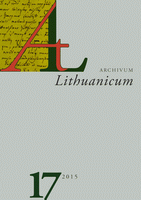Jacob Grimm und die litauische Sprache – I. Studien und Korrespondenzen
Jacob Grimm and the Lithuanian language. - I. Studies and Correspondence
Author(s): Philip KrautSubject(s): Theoretical Linguistics, Historical Linguistics, Baltic Languages, Philology
Published by: Lietuvių Kalbos Institutas
Keywords: Jacob Grimm; Lithuanian language; Baltic languages; Slavonic languages; Grimm's law; Friedrich Kurschat;
Summary/Abstract: This article summarizes Jacob Grimm’s research on the Baltic languages and cultures, Lithuanian in particular. Although Grimm never published an exclusive textbook on this subject, throughout his life he researched the genetic relationship between Lithuanian and the Germanic and Slavonic languages and certain aspects of Baltic literature and culture. The starting point for his interest was his reading of Rasmus Kristian Rask’s Undersögelse om det gamle Nordiske eller Islandske Sprogs Oprindelse (Kopenhagen 1818). In 1822, in his new edition of the Deutsche Grammatik, he also used Lithuanian as a cognate language to establish the First Germanic Sound Shift, which became famous as Grimm’s law. At this time, Grimm’s interest in Baltic languages also became apparent in his scholarly correspondence with the important German philologists Georg Friedrich Benecke and Karl Lachmann, in which he discussed issues of Lithuanian and the Old Prussian language and related specialist literature. As early as 1824, Grimm drew attention to a possible closer genetic relationship between the Baltic, Slavonic, and Germanic languages. Thanks to his rich annotations in his Lithuanian books, one can observe that Grimm read and understood Lithuanian fluently. The East Prussian promoters and collectors of Volkspoesie, Ferdinand Gottschalk and Cornelius Roose, wrote letters to Jacob Grimm that are published in this article for the first time, and also sent him collections of Lithuanian Volkspoesie. Jacob Grimm received contemporary baltistic specialist literature by Friedrich Kurschat, Georg Heinrich Ferdinand Nesselmann, and August Schleicher. The results of Grimm´s Baltic studies were published, e.g., in his Deutsche Grammatik or in reviews. When he began work on the Deutsches Wörterbuch 1851/52, he was able to participate at a high level in baltistic specialist discourse.
Journal: Archivum Lithuanicum
- Issue Year: 2015
- Issue No: 17
- Page Range: 133-166
- Page Count: 34
- Language: German

